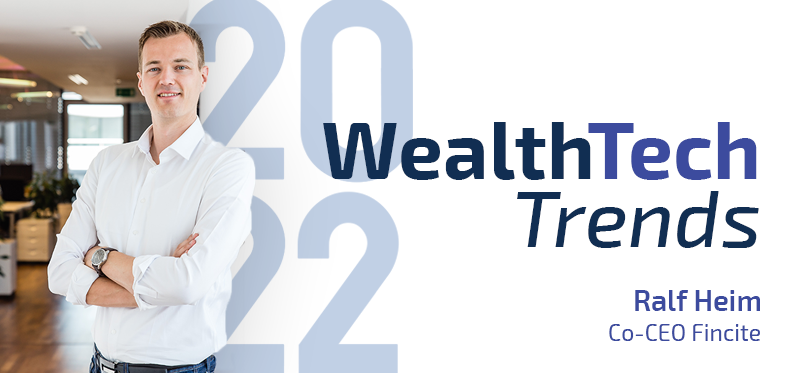
5 #WealthTech Trends shaping the industry in 2022 (+Bonus Track)
Ralf Heim / December 22, 2021
In 2021 a lot of trends in the investment industry moved towards the “plateau of productivity” as Gartner would describe it in the “Hype Cycle” model.But what exactly are these trends? We identified 5 topics that will shape the wealth industry in 2022 and beyond.
And as always, it starts with the customer:
1) A new generation of wealth enters the stage and will become a big source for net new assets
If you look at the Forbes 400 today, you will find that Tech entrepreneurs are among the wealthiest persons in the world. This trend reaches Europe. Since we started Fincite, the number of Startups valued at > 100 million € grew by 20x. This generated wealth for entrepreneurs, investors, and early employees. It created an ecosystem of wealth consisting of tech people, bitcoin millionaires, sports & entertainment stars and many more, mostly at a young age. This group of people, we call them the next generation wealth is tech-savvy and demands an outstanding customer experience.
2) The future is hybrid. Customers demand a frictionless experience combining technology and human advice.
If brokers like Trade Republic and Robinhood offer a better digital user experience than a private bank or wealth manager, it will become an issue for established institutions. We got used to a beautiful UX in our day-to-day lives and customers get intolerant towards bad UX. The acceptance for paper-based reporting, outdated online banking interfaces, and complex onboarding processes is decreasing. Covid accelerated this trend massively and we all could see a huge increase in the adoption of digital processes. Customers will demand a seamless user experience and frictionless handover from digital processes and human advice. Robo Advisors are adding human advice elements for premium customers already and advisory firms and wealth managers are increasing their digital capabilities.
3) Customers want a holistic overview of their financial situation
Customers, especially wealthy ones, have many different assets and accounts. They often have their own brokerage account next to an advisory or portfolio management mandate. They own real estate, sometimes venture capital, private equity, Crypto or private debt (see trend 4). While customers often think holistic about their wealth, most institutions offer their services in silos.
Even though Fincite started with holistic advice (based upon Open Banking and Wealth Aggregation) in mind, we see the starting point of aggregation in Reporting. And very often aggregation starts in the liquid space (brokerage, advice or portfolio management).
However, before we see aggregated wealth reporting entering mass affluent, investment service providers will start to improve their basic digital reporting capabilities. Wealth Aggregation often comes as a second step. After we looked at the customer experience, let us dig deeper into the crafting of portfolios.
4) Alternative investments are on the rise. Don’t look away!
For many years the quota of alternative investments in wealth portfolios is growing strongly. Like in previous years we see a strong increase of affluent customers investing more into alternatives.
Nowadays alternative investments have become a common asset class not only for wealthy investors. Looking at the categories they are as popular as diverse, ranging from private debt and infrastructure to liquid crypto investments to private equity, Venture Capital, real estate, Whiskey, Arts, and NFTs. 10 years ago, alternative investments required great wealth, high effort to invest, and were difficult to find and compare. New Platforms like Moonfare, Inventure, Mintos and many more made alternatives more accessible.
5) Direct Indexing – Will portfolio construction without funds become a superior alternative?
When I visited the US in November 2021, direct indexing was just everywhere the talk of the town. The idea behind direct indexing is to cut out the middleman for a good portfolio allocation – the fund. This is fueled by the strong decrease in order costs and the growth of discretionary portfolio management as a service model. Tax optimization is another huge driver for direct indexing in the US. I’m quite convinced that customer-centric portfolio management is going to be a strong trend in the upcoming years. If the order infrastructure allows it, direct indexing might compete with actively managed funds esp. in private banking portfolios. If that makes ETFs obsolete, is not yet certain.
Bonus Track: Sustainable investments and ESG products! Who would say no?
ESG was a big trend in 2021. Especially for funds and product manufacturers. For Advisors and Wealth Managers the upcoming regulation will ensure that ESG grows from a trend towards a standard. Despite (rightful) concerns in data quality, it will become mandatory within the EU to ask customers if they want to include sustainable products into their portfolios.
What does it mean for the investment industry?
All 5+1 trends increase the pressure for advisors and wealth managers, inside and outside of banks, to move to digital processes. The consolidation of investment service providers, such as we saw in the registered investment advisor market in the US, is gaining momentum in Europe as well. Private Equity Firms are already active in the custodian and pool market, but they will move into advisory and wealth firms as well.
The next decade of investment services will be built on modern technology.
What are your thoughts about the WealthTech Trends in 2022? Contact us
Did you like the article? Feel free to share it on social media:




